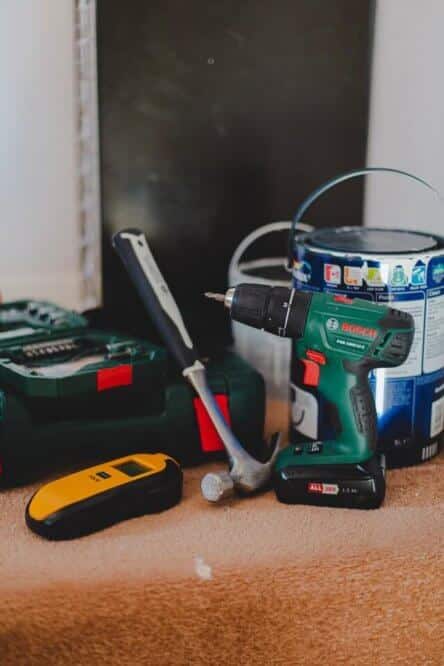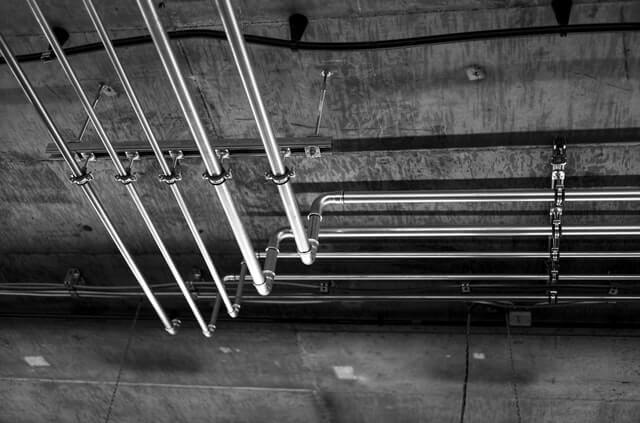Just the thought of being poisoned by an invisible, deadly gas is probably sending shivers down your spine. In the end, this is why you’ve bought the carbon monoxide detector. So what to do when you have a carbon monoxide detector beeping?
Does this necessarily mean that there is a gas leak in the house?
A carbon monoxide detector is crucial for a family’s safety. This is why it must be working properly.
When the sound that can be the alarm goes off, it’s normal to be scared.
However, carbon monoxide detector beeping doesn’t mean that there has to be deadly gas in your house.
Sure, it is always recommended that you leave the house first, but other things can cause this.
First, we’ll go through some symptoms of carbon monoxide poisoning.
Then, once you have ruled that out, read more to find out what can be wrong with your device.
Some of these problems can be solved without any issues. Others require professional help.
Carbon Monoxide Poisoning
Carbon monoxide (CO) is a by-product of incomplete combustion. It’s a deadly gas that can cause serious life-threatening conditions.
The biggest sources of carbon monoxide are oil appliances or other heaters that aren’t working properly. Fireplaces can also cause carbon monoxide levels to rise if the chimney is clogged.
If your carbon monoxide detector is beeping, and you have the symptoms of poisoning, get out of your house immediately! These symptoms include:
- Headache
- Dizziness
- Nausea
- Vomiting
- Short breath
- Rapid heartbeat
- Confusion
If you are experiencing any of these symptoms, don’t ignore the alarm. Get out of the property and call 911 as fast as possible.
Don’t re-enter the house under any circumstances! Carbon monoxide poisoning can lead to long-lasting health problems, even death. [1]
How to Know if There Is a Gas Leak?
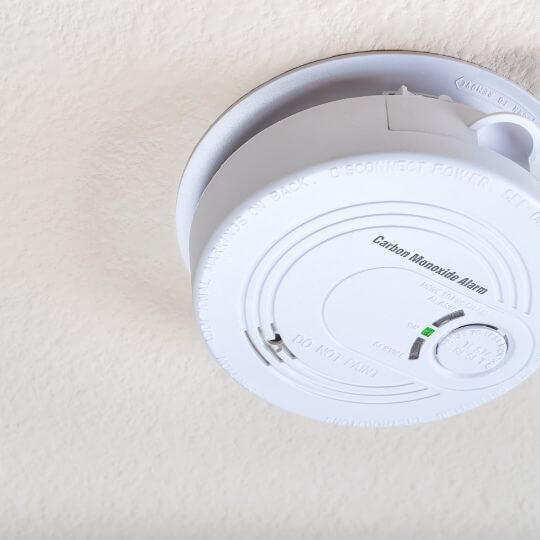
According to the First Alert, the common alarm sound for a gas leak is four beeps and a pause. If this happens, don’t tag along to ensure that the alarm is working properly. Get out to safety right away.
Are you wondering who do you call if your carbon monoxide detector goes off? You should call the fire department, police or 911.
Take notice of any of the poisoning symptoms that are listed above. If you feel dizzy, call the emergency as you might need to go to the hospital.
Be sure that everyone is safe outside of the property.
Why is my carbon monoxide detector beeping every 30 seconds?
If you have a carbon monoxide detector beeping five times in a minute, it’s running out of power. This is also called “End of Life”.
Most carbon monoxide alarms have a life of five to seven years. Even when the battery doesn’t run out, it’s still a good idea to change your detector every seven years.
Sensors in the alarm don’t last forever, and you don’t want to risk your safety.
Some modern carbon monoxide detectors have a longer lifespan and can last up to a decade.
Still, when you hear your carbon monoxide detector beeping calmly but continuously, you know what to do. It’s time to buy a new one.
This is required legally, actually. CO legislations state that you must have a working alarm.
What to do if my carbon monoxide detector is beeping once every minute?
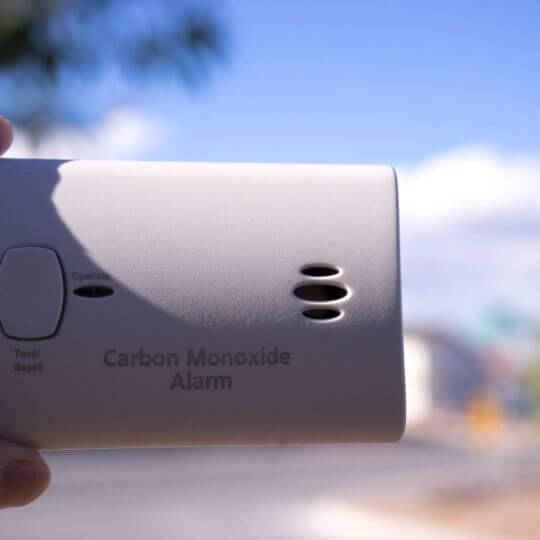
If your carbon monoxide detector is having slow but continuous beeps, don’t worry right away.
This most likely means that its batteries are running low.
The duration of the batteries depends on the device’s model. It’s important to check if your alarm is working properly every now and then.
When the battery isn’t working, a gas leak might happen and it’ll go undetected. This is extremely dangerous.
Luckily some devices can be plugged in and don’t require an additional power source other than AC.
These carbon monoxide detectors usually have a battery back-up. In case the power goes off, you will still be protected, at least for a while.
This is great if you live in a neighborhood where power outages are common.
What Does One Long, Continuous Beep Mean?
On rare occasions, you will hear a long squeak coming from your carbon monoxide detector. Whether this will happen or not depends on your specific model.
It usually means that the alarm has been unplugged. When something happens to the power source, it may cause the alarm to beep continuously.
Other times, it means that the alarm has malfunctioned. If the power is working fine, call a professional to see what is wrong with the device.
You don’t want to be left without protection.
How Do I Get My Carbon Monoxide Detector to Stop Beeping?
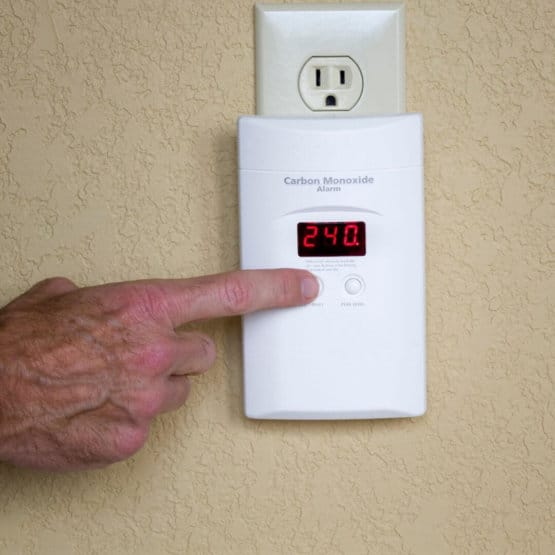
When you have a carbon monoxide detector that is beeping, you must first know what the cause is. As we have already stated, not every beeping means the same.
If you hear the emergency alarm, you shouldn’t do anything else but get outside. Don’t worry about the noise.
Your lives are more important than your neighbor’s ears. Even if it’s a false alarm, you don’t want to risk it.
Carbon monoxide is an extremely dangerous gas and you should leave everything to the professionals.
When you hear continuous beeping, see if something didn’t happen to the cord leading to the device.
Maybe it got unplugged by accident. Usually, this is a problem that can be solved quickly.
Try plugging it in again or putting some tape on the broken cord.
When you hear the battery alarm, the situation is a bit simpler.
The only thing you should do is replace the batteries.
The number and type of batteries depend on your device. Try looking at the manual to see what the requirements are.
Usually, the process isn’t difficult. You should take down the CO detector and open the back of it.
This will reveal the batteries. You simply replace them, close the compartment and return the device on its place.
This will usually stop the carbon monoxide detector from beeping.
Another good thing is to check the sensing chamber. If the filters get dirty, it can produce the same sound as the end of life or dead batteries alarm.
Clean the air filter with a damp cloth. Just make sure it doesn’t get wet! This will break the device and cause it to malfunction.
For the End of Life alarm, there is no real solution… You must buy a new device. Nothing else will fix the problem. These devices aren’t eternal.
If the sound doesn’t correspond with anything we’ve written, or if everything else has failed, there is one more thing. Try doing the oldest trick of it all. Just turn it on and off again.
Yes, it’s that simple. Sometimes resetting the device is everything it needs to try working again. Turning it on and off might be a good way to stop the beeping.
In the end, you can always buy a new alarm. They aren’t expensive and most times you can install them by yourself.
How to Prevent Carbon Monoxide Poisoning
Although carbon monoxide can leak for many reasons, there are some things you can do to lower your risk.
Your appliances need to be annually maintained. Only a certified professional can do this properly. This is important as you will be sure that all of the appliances are working properly.
Malfunction of home devices is the main cause of the gas leak. Cleaning the chimney regularly will also help. This way the contaminated air and smoke will have where to leave the house.
You probably have at least one carbon monoxide detector at your home. This is because most US state laws demand you have one installed.
However, you can always install more. This way you will know the danger is approaching before the gas spreads. Do this for sure if you are heating your home on a gas oven!
Although we don’t recommend that kind of heating device whatsoever.
Another important advice is that you should never run your vehicle or any other gas equipment inside a confined space.
Believe it or not, a lot of accidents happen when the car is running in a small, closed garage.
And the last thing, unblock your home’s vents. Ventilation is important so that gas has a way to get outside.
Without the ventilation, the oxygen levels will go down, and the carbon monoxide levels will rise. This is the situation you’d want to avoid at all costs!
Final Word
So, the best answer to the question ‘How do I get my carbon monoxide detector to stop beeping’ is… You better don’t. At least not unless you are completely sure you don’t have a gas leak in your house! It’s better to call the emergency numbers than to risk your health and life.

Michael Davis is a heating & plumbing expert who currently works as independent contractor in SC. He also writes for Plumbertip.
For almost 10 years he worked on various plumbing tasks across South Carolina.

